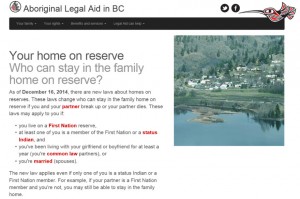New Law Focuses on Aboriginal Matrimonial Rights on Reserve
 The Family Homes on Reserve and Matrimonial Interests or Rights Act brings into force new laws regarding homes on reserve as of December 16, 2014. The law details who can stay in the family home on a reserve if you and your spouse split up or your spouse passes away.
The Family Homes on Reserve and Matrimonial Interests or Rights Act brings into force new laws regarding homes on reserve as of December 16, 2014. The law details who can stay in the family home on a reserve if you and your spouse split up or your spouse passes away.
The law highlights the issue of status. You may be able to remain in the family home even if you’re not a First Nation member and your spouse is.
LSS’s Aboriginal Legal Aid BC website has resources and information to help guide you through the new law.
Why the law was needed
If you were not a First Nations member or status Indian, and your relationship ended or your spouse died, you may not have been allowed to remain in the family home. Due to the negative impact on families – particularly women and children – the law was needed to provide families with rights and options.
What you’ll need to know
Aboriginal Legal Aid BC lists for whom the law applies:
- At least one of you is a First Nation member or status Indian
- You’re married (spouses)
- You’re common law (living with your partner for at least a year)
- You live on a First Nation reserve
Who the Law Doesn’t Apply To
The Aboriginal Legal Aid BC website has a list of persons the new law doesn’t apply to including if your reserve has a self-government agreement, its own land code or its own matrimonial real property laws.
Any upset to the family dynamic can be stressful. For families on reserve, the added weight of matrimonial real property rights and who can remain in the family home on reserve can potentially increase pressure and stress on all parties involved. It is important to note courts will consider the best interests of the children as keeping connections to their First Nations culture, social and family ties are essential.

